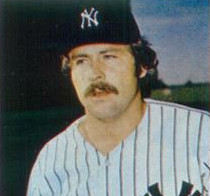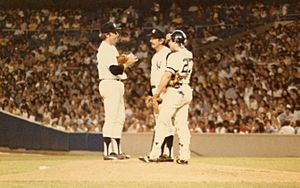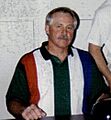Catfish Hunter facts for kids
Quick facts for kids Catfish Hunter |
|||
|---|---|---|---|

Hunter with the New York Yankees, c. 1977
|
|||
| Pitcher | |||
| Born: April 8, 1946 Hertford, North Carolina, U.S. |
|||
| Died: September 9, 1999 (aged 53) Hertford, North Carolina, U.S. |
|||
|
|||
| debut | |||
| May 13, 1965, for the Kansas City Athletics | |||
| Last appearance | |||
| September 17, 1979, for the New York Yankees | |||
| MLB statistics | |||
| Win–loss record | 224–166 | ||
| Earned run average | 3.26 | ||
| Strikeouts | 2,012 | ||
| Teams | |||
|
|||
| Career highlights and awards | |||
|
|||
| Induction | 1987 | ||
| Vote | 76.3% (third ballot) | ||
James Augustus Hunter (born April 8, 1946 – died September 9, 1999) was a famous American baseball player. He was known by his nickname, "Catfish". From 1965 to 1979, he was a star pitcher in Major League Baseball (MLB). He played for the Kansas City/Oakland Athletics and the New York Yankees.
Catfish Hunter was an amazing pitcher. He was the first pitcher since 1915 to win 200 games by the age of 31. He also became known as baseball's first "big-money free agent". This meant he could choose which team to play for and sign a very valuable contract. Hunter was part of five teams that won the World Series. He retired at age 33 because of arm problems. In 1987, he was inducted into the Baseball Hall of Fame. Hunter later developed a serious illness called ALS, also known as Lou Gehrig's disease, and passed away from it.
Contents
Early Life and Baseball Dreams
Catfish Hunter was the youngest of eight children. He grew up on a farm in Hertford, North Carolina. He was very good at many sports at Perquimans County High School. He played football as a linebacker and offensive tackle. In baseball, he was a shortstop, cleanup batter, and pitcher. His older brothers helped him learn how to pitch. Soon, professional baseball scouts started noticing his talent.
In November 1963, during his senior year, Hunter had a hunting accident. His right foot was injured, and he lost one of his toes. Shotgun pellets also got stuck in his foot. This injury made many scouts worried about his future in baseball. However, the Kansas City Athletics still decided to sign him to a contract. Hunter had surgery at the Mayo Clinic and recovered at the farm of the Athletics' owner, Charlie Finley.
Professional Baseball Career
Starting with the Athletics
Hunter signed with the A's on June 8, 1964. He received a large signing bonus of $75,000. Because of his foot surgery, he didn't play in the regular season that year. He made his first professional baseball appearance in the Florida Instructional League in the fall of 1964.
It's often said that team owner Charlie Finley gave Hunter the nickname "Catfish" in 1965. Finley thought his young pitcher needed a memorable name. Some stories claimed his family gave him the name as a child after he was found with catfish. However, this story isn't true. News articles from 1964, right after he signed, already mentioned the nickname.
Hunter never played in the minor leagues. He went straight to the major leagues. He made his MLB debut in May 1965. He earned his first win on July 27 against the Boston Red Sox. In 1966 and 1967, he was chosen to be an American League All-Star.
Moving to Oakland and a Perfect Game
Before the 1968 season, the A's team moved from Kansas City to Oakland, California. On May 8, 1968, Catfish Hunter made history. He pitched the ninth perfect game in baseball history. A perfect game means no opposing player reaches base in any way. It was the first perfect game in the American League in 46 years. Hunter also helped his team win by getting three hits and driving in three runs himself. He even gave his catcher, Jim Pagliaroni, a gold watch to thank him.
Hunter continued to be a winning pitcher. In 1974, he had an amazing season. He won 25 games and had the best earned run average in the league. He won the American League Cy Young Award, which goes to the best pitcher. The A's also won their third straight World Series that year. While with the Athletics, Hunter had four years in a row where he won at least 20 games. He won 161 games for the A's in total.
Becoming a Free Agent
In 1974, Hunter signed a contract with the A's. It included payments to a special life insurance plan. However, the team owner, Charlie Finley, refused to make these payments. This led to a legal dispute. On December 16, 1974, an arbitrator (a neutral decision-maker) ruled in favor of Hunter. This made him a "free agent." This meant he was no longer tied to the A's and could sign with any team. Hunter later said he was scared at first because he felt like he didn't "belong to anybody."
Joining the New York Yankees

Just two weeks after becoming a free agent, Hunter signed a huge contract with the New York Yankees. It was worth $3.35 million over five years. This made him the highest-paid player and pitcher in baseball at the time. Many teams wanted him, but he chose the Yankees because it was closer to his home in North Carolina. He also liked that they played on natural grass.
Hunter had a tough start with the Yankees, losing his first three games. But he quickly improved and was named an All-Star again. He led the league in wins (23) for the second year in a row. He also led the league in innings pitched and complete games. He was the last major league pitcher to throw 30 complete games in a season. Hunter also became only the fourth American League pitcher to win 20 games for five seasons in a row (1971–1975).
In 1976, Hunter won 17 games and was an All-Star again. The Yankees won three straight league championships with Hunter from 1976 to 1978. In 1976, Hunter became the fourth pitcher to win 200 games before turning 31. Before the designated hitter rule in 1973, Hunter was also a good hitter.
In 1978, Hunter started having arm injuries. He was also diagnosed with diabetes. These health issues began to affect his energy and pitching. After the 1979 season, when his contract ended, Hunter retired from baseball at age 33. He won 63 games with the Yankees. He retired having played in six World Series and winning five championships.
Later Life and Legacy
After retiring, Catfish Hunter returned to his farm in Hertford, North Carolina. He grew crops like soybeans, corn, and cotton. He also became a spokesperson to raise awareness about diabetes. In 1997, he noticed weakness in his arm. He was later diagnosed with amyotrophic lateral sclerosis (ALS), also known as Lou Gehrig's disease.
Hunter passed away at his home in Hertford on September 9, 1999, at age 53. He died about a year after his ALS diagnosis. He is buried in Cedarwood Cemetery in Hertford, right next to the baseball field where he played in high school.
Honors and Awards
In 1987, Catfish Hunter was inducted into the National Baseball Hall of Fame and Museum in Cooperstown, New York. When players are inducted, they usually choose which team's logo appears on their Hall of Fame plaque. Hunter spoke highly of both the Athletics and the Yankees. Because he couldn't choose between them, his plaque shows him without any team logo on his cap.
In 1990, Hunter was inducted into the Bay Area Sports Hall of Fame. In 2004, the Oakland Athletics created the Catfish Hunter Award in his honor. His jersey number, 27, was retired by the Oakland Athletics in 1991. This means no other player on the team can wear that number. It was the first number ever retired by the Athletics franchise.
There is a Jim "Catfish" Hunter Memorial in Hertford, North Carolina. An annual softball event is also held there in his memory. All money raised from this event goes to ALS research. Since 1999, the tournament has raised over $200,000. On September 5, 2018, Hunter was inducted into the Oakland Athletics Hall of Fame. His wife, Helen, accepted the honor for him.
Career Statistics
| Category | Wins | Losses | Winning Pct. | ERA | Games | Starts | Complete Games | Shutouts | Saves | Innings Pitched | Hits | Earned Runs | Runs | Home Runs | Walks | Strikeouts | Wild Pitches | Hit by Pitch |
|---|---|---|---|---|---|---|---|---|---|---|---|---|---|---|---|---|---|---|
| Total | 224 | 166 | .574 | 3.26 | 500 | 476 | 181 | 42 | 0 | 3,449+1⁄3 | 2,958 | 1,248 | 1,380 | 374 | 954 | 2,012 | 49 | 49 |
See also
- List of Major League Baseball annual ERA leaders
- List of Major League Baseball annual wins leaders
- List of Major League Baseball career strikeout leaders
- List of Major League Baseball career shutout leaders
- List of Major League Baseball career wins leaders
Images for kids
 | William Lucy |
 | Charles Hayes |
 | Cleveland Robinson |



